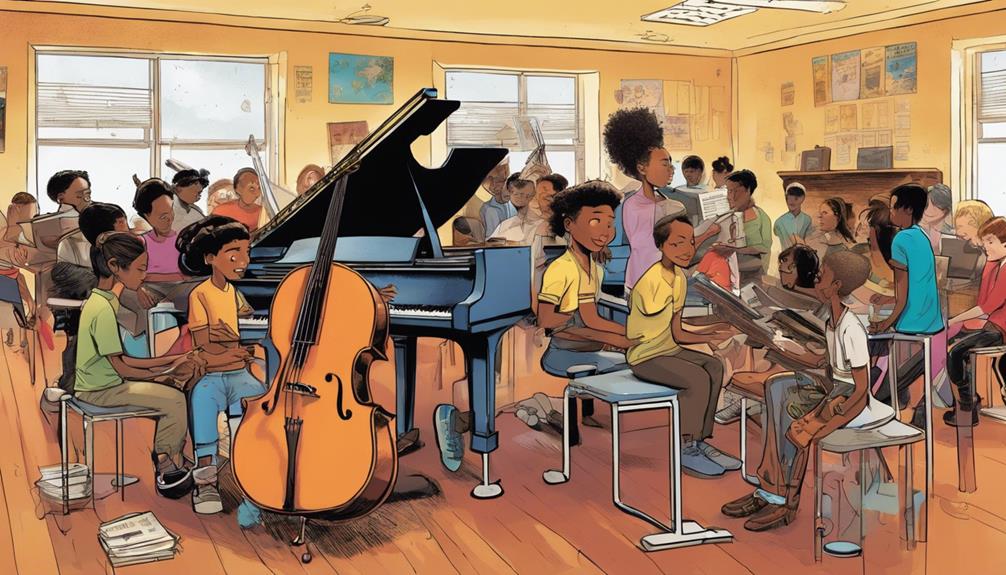To start a successful music school, begin by defining your vision, mission, and values. Conduct thorough market research to identify your target demographic, analyze competition, and stay updated on industry trends. Develop a realistic budget plan, considering startup costs, revenue streams, and potential pitfalls. Invest in relevant education, such as a master's degree in music education, and choose a strategic location that's accessible and visible. Hire qualified music teachers, build a strong brand identity, and develop effective marketing strategies. Finally, create a fun and engaging learning environment that fosters creativity and community. By following these steps, you'll be well on your way to establishing a thriving music school. Additionally, establish clear policies and curricula to ensure consistency and structure in your programs. Preparing for music school also involves equipping your facility with quality instruments and resources to enhance the learning experience. Regularly gather feedback from students and parents to refine your offerings and maintain high standards of excellence.
Key Takeaways
- Establish a clear mission statement and core values to guide your music school's vision and decision-making.
- Conduct market research to identify your target demographic, analyze competition, and stay updated on industry trends.
- Develop a detailed budget and financial plan, including startup costs, revenue projections, and contingency funds.
- Hire qualified music teachers with formal education, teaching experience, and certification in music education or performance.
- Create a strong brand identity with a unique name, logo, and consistent brand image across all platforms.
Define Your Music School Vision
What kind of music school do you want to create, and what impact do you want it to have on your students' lives?
Defining your music school vision is an important step in establishing a successful institution. It begins with crafting a clear mission statement that outlines your school's purpose and values. This statement will serve as the foundation of your school's identity and guide its operations.
Your vision should encompass specific goals and objectives that you aim to achieve, such as providing high-quality education, fostering a supportive community, or offering specialized programs.
It's vital to articulate the core values that will shape your school's culture, such as excellence, creativity, or inclusivity. Consider the needs and aspirations of your target student demographic to make sure your vision aligns with their goals.
A well-defined vision will help you make informed decisions, allocate resources effectively, and measure your school's growth and impact. By establishing a clear direction, you'll be better equipped to create a music school that makes a lasting impact on your students' musical journeys.
Conduct Market Research Thoroughly

To guarantee your music school stands out in a crowded market, you'll need to conduct thorough market research that provides a in-depth understanding of your target audience, competitors, and industry trends.
Start by identifying your target demographic, including age groups, music preferences, and skill levels. This will help you tailor your offerings to meet the demands of your potential students. Next, analyze the competition by examining the services offered, pricing structure, and reputation of existing music schools in the vicinity.
Here's a snapshot of what your market research might look like:
| Category | Data | Insights |
|---|---|---|
| Target Demographic | Age: 5-18, Music preferences: pop/rock, Skill levels: beginner | Focus on offering beginner lessons in popular genres |
| Competition | 5 music schools in a 5-mile radius, Average tuition fees: $30-$50 per lesson | Competitive pricing strategy needed |
| Industry Trends | Growing demand for online lessons, Increasing popularity of ukulele | Consider offering online lessons and ukulele classes |
| Music Education Trends | Emphasis on music theory, Increasing focus on performance skills | Develop curriculum that balances theory and performance |
| Pricing Strategy | Average tuition fees: $30-$50 per lesson, Discounts for package deals | Offer competitive pricing with discounts for loyalty |
Develop a Realistic Budget Plan

With your market research in hand, you're now ready to develop a realistic budget plan that accounts for all the expenses involved in launching and running a successful music school. To start, calculate your startup costs, including rent, equipment, marketing, and staff salaries.
Research average expenses for music school operations to create a detailed budget that factors in both expected and unexpected costs, such as repairs, licenses, and insurance. Don't forget to include revenue projections and potential income streams to balance your budget. Seeking financial advice or using budgeting tools can guarantee a thorough financial plan.
A well-planned budget will help you allocate resources effectively, make smart financial decisions, and avoid financial pitfalls. By considering all the expenses and revenue streams, you'll be able to create a detailed budget that sets your music school up for success.
Invest in Relevant Education

Investing in relevant education can greatly enhance your teaching skills, credibility, and ultimately, the success of your music school. By pursuing an online master's degree in music education, you'll gain a deeper understanding of music theory, which will enable you to create more engaging and effective lessons for your students.
Additionally, you'll develop expertise in classroom management, allowing you to maintain a productive and respectful learning environment. This education will also equip you with the skills to design and implement curriculum development, ensuring your lessons are tailored to meet the needs of your students.
Networking with other music educators and professionals in the industry can provide valuable insights and growth opportunities. You'll learn about the latest educational technologies and best practices in music education, which will help you stay ahead of the curve.
Choose a Strategic Location

When selecting a strategic location for your music school, consider the proximity to your target audience, such as schools and residential areas, to guarantee easy accessibility for potential students.
You'll also want to prioritize locations with ample parking, as this won't only attract more students but also provide a convenient experience for them.
Proximity to Target Audience
Locating your music school near schools and residential areas can greatly enhance your chances of attracting students and parents who are already invested in their children's education and extracurricular activities. This proximity to your target audience can lead to a higher volume of potential students, as well as increased foot traffic and accessibility for commuters.
Here are three key benefits to take into account:
- Increased visibility: A location near residential areas and schools means more people will see your school, generating interest and attracting potential students.
- Better community integration: By aligning your school with the community's musical interests, you'll be better positioned to integrate with local events and activities, further boosting your visibility.
- Easier marketing: With a strategic location, you'll have more opportunities to promote your school, making it easier to attract students and grow your business.
Easy Accessibility and Parking
When establishing a music school, you'll want to choose a location that offers easy accessibility and ample parking, ensuring a hassle-free experience for students, parents, and staff alike. A vital high-visibility area with easy accessibility is important for student drop-offs and pickups, making it convenient for parents to bring their kids to and from classes.
Additionally, consider a location near public transportation hubs to increase foot traffic and attract more students. However, it's crucial to balance accessibility with minimal noise disturbances, creating an environment conducive to focused music learning sessions.
Moreover, prioritize safety and security measures in the vicinity to guarantee student and staff well-being. A location with ample parking spaces will also reduce congestion and stress, making it easier for everyone to navigate the area.
Design Inspiring Facilities

By incorporating vibrant colors, eclectic artwork, and playful textures, you can craft a music school facility that sparks imagination and fuels creativity in your students. A well-designed space can make all the difference in inspiring your students to learn and grow.
Here are three essential elements to take into account when designing your music school facilities:
- Critical design elements: Incorporate engaging visuals to stimulate creativity and inspiration in students.
- Create an inviting atmosphere: Establish a comfortable space with ample natural light and cozy seating areas.
- Soundproofing materials: Guarantee a distraction-free learning environment with high-quality soundproofing materials.
In addition to these elements, consider utilizing technology like interactive whiteboards and recording equipment to enhance music education. Acoustic treatments and proper instrument storage are also vital in maintaining a professional and organized space. By incorporating these design elements, you can create a music school facility that's both functional and inspiring, setting your students up for success.
Hire Qualified Music Teachers

You'll want to recruit music teachers who not only possess the necessary technical skills but also have the passion and ability to inspire and motivate their students. When hiring music teachers, prioritize those with formal education in music, such as degrees in music education or performance. Teaching experience in various music genres and proficiency with different instruments are also essential.
| Qualification | Description | Importance |
|---|---|---|
| Formal Education | Degree in music education or performance | High |
| Teaching Experience | Experience in various music genres and instruments | High |
| Certification | Certification in music education or relevant associations | Medium |
| Student Success | Proven track record of student success | Medium |
| Communication Skills | Strong communication and interpersonal skills | High |
Look for certification in music education or relevant associations like MTNA or ABRSM. A proven track record of student success, such as performances or competition wins, is also a significant factor. Ultimately, make certain that the music teachers you hire possess strong communication and interpersonal skills to connect with students effectively. By considering these factors, you'll be able to assemble a team of qualified music teachers who can provide high-quality instruction and inspire their students to reach their full potential.
Build a Strong Brand Identity

With your team of qualified music teachers in place, it's now time to focus on building a strong brand identity that sets your music school apart from the competition and resonates with potential students. A well-crafted brand identity will help you attract students and establish your school as a reputable institution in the music education industry.
Here are three essential elements to contemplate when building your brand identity:
- Unique Name and Logo: Develop a memorable logo and choose a unique name that differentiates your music school from others.
- Consistent Brand Image: Create a consistent brand image across all marketing materials and online platforms to build recognition and trust.
- Brand Voice and Visuals: Develop a brand voice that resonates with your target audience and reflects your school's values, and utilize colors, fonts, and imagery that align with your school's identity.
Develop Effective Marketing Strategies

Developing effective marketing strategies is essential to attracting new students and growing your music school's enrollment, as it allows you to showcase your school's unique offerings and values to a targeted audience. To reach a wider audience, utilize social media platforms like Facebook, Instagram, and YouTube to share engaging content such as video tutorials, student performances, and behind-the-scenes glimpses. This will help potential students get a sense of your school's culture and values.
| Marketing Strategy | Description | Benefits |
|---|---|---|
| Social Media | Share engaging content on Facebook, Instagram, and YouTube | Reach a wider audience |
| Local Collaborations | Partner with local businesses, music stores, and community centers | Cross-promotion and increased visibility |
| Referral Incentives | Offer rewards for current students to bring in new enrollments | Expand student base |
| Online Advertising | Target specific demographics interested in music education | Increased enrollment |
| Engaging Content | Create video tutorials, student performances, and behind-the-scenes content | Showcase school's offerings |
Create a Fun Learning Environment

By carefully designing your music school's physical space, you can create a fun and engaging learning environment that inspires students to explore their musical talents. A well-designed space can boost student morale, foster creativity, and enhance the overall student learning experience.
To achieve this, consider the following design elements:
- Vibrant colors: Incorporate warm and inviting colors into your school's decor to create a welcoming atmosphere.
- Engaging space: Design an open and engaging space with ample natural light to stimulate creativity and student morale.
- Optimized classroom layout: Organize classrooms and studios to facilitate effective teaching practices and promote a sense of community among students.
Frequently Asked Questions
How to Start a Music School?
To start a music school, you'll need to conduct market research, develop a business plan, secure a strategic location, hire qualified instructors, and invest in quality instruments and materials to create a thriving music education hub.
How to Learn Music for Beginners Step by Step?
"Manifest your musical mastery by selecting an intriguing instrument, finding a fantastic teacher, and practicing persistently. Then, learn lush lessons in music theory, and join a jubilant group to jam with like-minded learners!"
What to Know Before Music School?
Before enrolling in music school, know your financial commitment, assess the demand in your area, and research the competition to make sure you're prepared for the investment and potential returns.
Can You Go to Music School as a Beginner?
Did you know 80% of successful musicians started with no prior experience? Yes, you can go to music school as a beginner Many schools offer programs that focus on building foundational skills like music theory and instrument basics.
Conclusion
As you commence on this exciting journey, remember that starting a music school requires dedication, hard work, and a willingness to learn.
You've laid the groundwork, now it's time to bring your vision to life. With persistence and passion, you'll create a thriving music school that inspires students to reach new heights.
The melody of success is within your grasp – now go make it happen.










